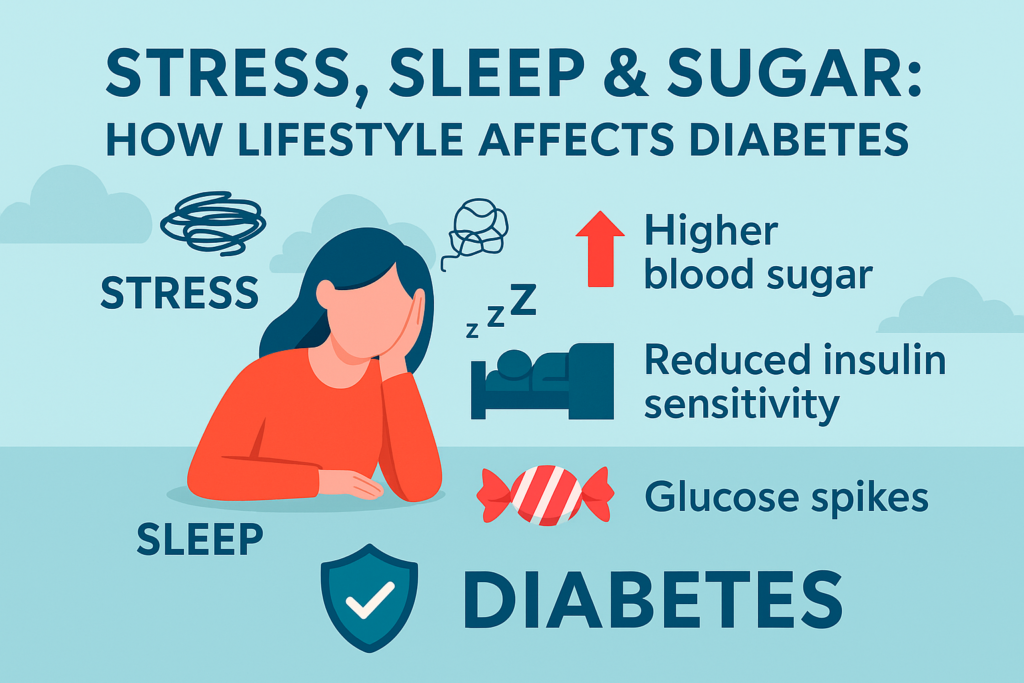

Introduction: Beyond Sugar – It’s About How You Live
Most people associate diabetes only with one word: sugar. But diabetes, particularly type 2 diabetes, is not just a sugar problem—it’s a lifestyle disorder. A person may eat a clean diet and still struggle with high blood glucose levels if their stress levels are unmanaged, sleep is disrupted, or daily habits are unhealthy.
In fact, modern science increasingly supports what ancient wisdom has long said—the way you live affects the way your body functions. In this blog, Dr. Ravi Kiran takes a deeper look at how chronic stress, poor sleep, and excess sugar intake form an invisible triangle that drives insulin resistance and pushes people toward full-blown diabetes.
🧠 The Role of Chronic Stress in Blood Sugar Elevation
When the body is under stress, whether due to work pressure, financial worries, relationships, or even traffic, it activates the sympathetic nervous system, also known as the “fight-or-flight” mode. This causes the release of stress hormones like cortisol and adrenaline. While helpful during emergencies, chronic exposure to these hormones can be damaging, especially to metabolic health.
Cortisol increases the release of glucose from the liver to prepare the body for action. However, if that energy is not used (as is the case with most mental stress), it remains in the bloodstream, resulting in elevated fasting blood glucose levels. Over time, this contributes to insulin resistance, belly fat accumulation, poor sleep, and eventually, diabetes.
Stress also drives people toward emotional eating—often choosing high-carb, high-sugar “comfort foods” that provide temporary relief but worsen the metabolic burden. These foods cause sugar spikes, mood crashes, and more cravings, perpetuating the cycle.
Breaking this loop requires not just dietary awareness but also emotional regulation. Techniques like mindfulness meditation, deep breathing, yoga, or even a 20-minute evening walk can lower cortisol and bring blood sugar levels down naturally.
😴 Sleep: The Underrated Metabolic Healer
Most adults need 7 to 8 hours of uninterrupted sleep each night for optimal health. Yet many with diabetes or prediabetes report poor sleep—either due to frequent urination, restless legs, obstructive sleep apnea, or high stress. Unfortunately, sleep deprivation and diabetes go hand-in-hand, each making the other worse.
Poor sleep has a direct effect on:
Insulin sensitivity: Less sleep makes your body less responsive to insulin, meaning more glucose stays in the blood.
Appetite regulation: Lack of sleep increases ghrelin (the hunger hormone) and decreases leptin (the satiety hormone), which leads to overeating and weight gain.
Craving control: Fatigue from poor sleep leads to greater desire for sugary and processed foods.
Moreover, people with sleep apnea, a common condition in those who are overweight, experience repeated drops in oxygen levels during sleep. This chronic interruption leads to inflammation, increased sympathetic activation, and worsened insulin resistance.
Improving sleep hygiene is often the first prescription in any diabetes reversal plan. Consistent bedtimes, limited screen exposure after 8 PM, reduced caffeine, and evening relaxation routines can make a measurable difference in morning blood glucose.
🍬 Sugar: It’s Not Just in Desserts
When we talk about sugar and diabetes, most people imagine sweets and desserts. But the real problem lies in hidden sugars—the kind found in packaged snacks, energy bars, breakfast cereals, sauces, salad dressings, juices, and even “healthy” processed foods.
The body metabolizes all refined carbohydrates—like white rice, bread, maida, and packaged foods—into glucose. The faster the food is digested, the higher the sugar spike. When these spikes happen repeatedly, the pancreas is forced to produce more insulin, leading to hyperinsulinemia. Over time, cells become resistant to insulin’s signal, and glucose accumulates in the bloodstream.
Adding to the problem is habitual snacking, mindless munching while watching screens, or using sugary foods to cope with emotional lows. This causes erratic blood sugar fluctuations, mood swings, and weight gain.
The key to breaking this loop lies in conscious eating:
Increase fiber intake through vegetables and whole grains
Add good fats like nuts, seeds, and ghee to improve satiety
Include proteins in every meal to stabilize glucose release
Read food labels and avoid anything with added sugars, high-fructose corn syrup, or “low-fat” claims
🔄 How These Three Work Together to Fuel Insulin Resistance
These three elements—stress, sleep, and sugar—don’t just act independently. They interact in harmful ways:
Stress reduces sleep quality, leading to hormonal imbalance.
Poor sleep increases cravings, especially for sugar-rich foods.
High sugar intake creates guilt and metabolic dysregulation, which further adds to stress.
This cycle leads to chronically elevated cortisol, poor insulin signaling, fat storage, and worsening of diabetes—even in people who eat “reasonably well.”
🩺 What You Can Do – Dr. Ravi Kiran’s Lifestyle Protocol
At the heart of diabetes reversal is not just controlling carbs—it’s about rebalancing your entire metabolic environment.
Dr. Ravi Kiran’s clinical protocol addresses:
Stress relief through mindfulness coaching, emotional resilience tools, and guided journaling
Sleep optimization via habit tracking, breathing practices, and treatment of sleep apnea if present
Smart sugar strategies, including personalized nutrition plans, label-reading education, and meal sequencing techniques (fiber first, then protein, then carbs)
This holistic approach aims not just to lower blood sugar temporarily, but to reverse insulin resistance at its root—naturally and sustainably.
✅ Summary: It’s a Lifestyle Loop You Can Break
| Factor | Harmful Impact | Healing Approach |
|---|---|---|
| Stress | ↑ Cortisol, ↑ glucose | Mindfulness, physical activity |
| Sleep | ↓ Insulin sensitivity, ↑ cravings | Sleep hygiene, screen-free evenings |
| Sugar | ↑ Glucose spikes, ↑ inflammation | Fiber, protein, meal balance |
🌟 Final Words
You can’t fix your sugar without fixing your life.
True diabetes care goes beyond counting carbs—it involves reducing stress, sleeping better, and retraining your body to process sugar more efficiently.
Even small lifestyle changes, when done consistently, can lead to massive shifts in your metabolic health. Start with one: go for a short walk after dinner. Or turn off your phone 30 minutes before bed. Or try 5 minutes of slow breathing when you’re stressed.
These are not just good habits—they’re powerful medicine.
🔗 Ready to Begin?
Join Dr. Ravi Kiran’s Diabetes Reversal Program and learn how to treat the root—not just the number.
📞 Book your consult now: https://drravikiran.in
📍 Hyderabad | Online Consultations Available